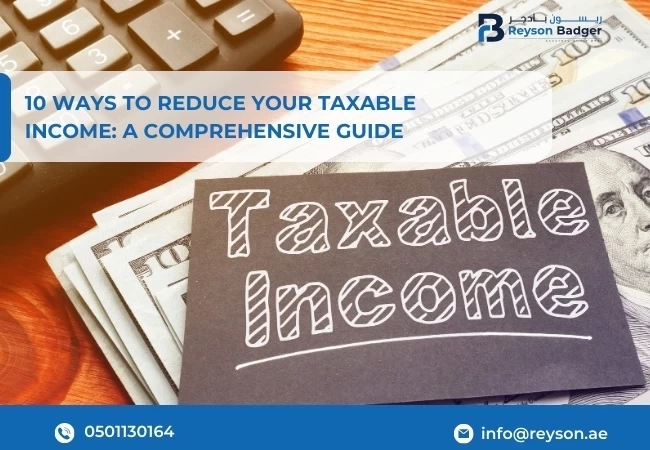

As the old adage goes, "Nothing is certain except death and taxes." However, with effective tax planning, you can minimize your tax liability and maximize your hard-earned income. Tax planning is an essential aspect of personal finance, as it helps you navigate the complex tax landscape and make informed decisions about your money. In this blog post, we will explore 10 practical ways to reduce your taxable income, helping you keep more of your money and achieve your financial goals. Whether you're a seasoned taxpayer or just starting out, this guide will provide you with valuable insights and actionable tips to optimize your tax strategy and reduce your taxable income in UAE.
Taxable income is the portion of an individual's or business's income that is subject to income tax. It is the income that remains after deducting allowable deductions and exemptions from total income. Taxable income is the basis for calculating an individual's or business's tax liability.
Taxable income is calculated by following these steps:
1. Determine total income: Include all sources of income, such as wages, salaries, tips, interest, dividends, and capital gains.
2. Deduct allowable deductions: Subtract deductions such as charitable donations, mortgage interest, and medical expenses from total income.
3. Apply for exemptions: Subtract personal exemptions, such as the standard deduction or itemized deductions, from total income.
4. Calculate taxable income: The resulting amount is taxable income, which is subject to income tax.
Reducing taxable income is crucial to minimizing tax liability. The lower your taxable income, the lower your tax bill will be. By reducing taxable income, you can:
Reducing taxable income can significantly impact your financial health. Here are ten effective strategies to help you minimize your tax liability in the UAE.
Maximizing retirement contributions is an effective way to reduce taxable income in the UAE. Contributions to retirement accounts, such as the UAE's End of Service Gratuity (EOSG) or international retirement plans like 401(k) or IRA, are tax-deductible. By contributing as much as possible to these accounts, individuals can reduce their taxable income and lower their tax liability.
Tax credits can significantly reduce taxable income in the UAE.Unlike tax deductions, which lower taxable income, tax credits directly decrease the total amount of tax owed. For example, the UAE's tax credit for charitable donations can help reduce taxable income. It's essential to understand the difference between tax credits and tax deductions to maximize tax savings.
Itemizing deductions can help reduce taxable income in the UAE. Instead of claiming the standard deduction, individuals can itemize deductions for expenses like mortgage interest, charitable donations, and medical expenses. This can be particularly beneficial for individuals with high expenses in these categories.
Investment losses can be used to reduce taxable income in the UAE. By selling investments that have declined in value, individuals can realize losses that can be used to offset gains from other investments. This strategy is known as tax-loss harvesting.
Health Savings Accounts (HSAs) are tax-advantaged accounts that allow individuals to set aside funds for medical expenses. Contributions to Health Savings Accounts (HSAs) are tax-deductible, and the funds grow tax-free. To qualify for an HSA, individuals must be enrolled in a high-deductible health plan (HDHP).
Flexible Spending Accounts (FSAs) are tax-advantaged accounts that allow individuals to set aside funds for medical expenses or dependent care. Contributions to FSAs are tax-deductible, reducing taxable income.
Business expenses can be deducted from taxable income in the UAE. Self-employed individuals and businesses can deduct expenses like home office expenses, travel expenses, and equipment costs. Accurate record-keeping is essential to support these deductions.
The home office deduction allows self-employed individuals and businesses to deduct a portion of their rent or mortgage interest as a business expense. This can be a significant deduction for individuals who work from home.
Charitable donations can be deducted from taxable income in the UAE. Donations to registered charities can help reduce taxable income, while also supporting good causes.
Consulting with a tax professional is essential to reduce taxable income in the UAE. Tax professionals can provide personalized advice on tax planning strategies, ensuring individuals and businesses take advantage of all eligible deductions and credits.
Reducing your taxable income is an important part of tax planning. There are different ways to do this. For example, you can put more money into retirement accounts. You can also look for tax credits. Don’t forget to deduct any business expenses too.
Tax laws change often, so it’s smart to talk to a pro like Reyson Badger. They can help you follow the rules and make the best choices for your taxes. By focusing on planning and getting expert advice, you can handle taxes more easily. This way, you can reach your financial goals.